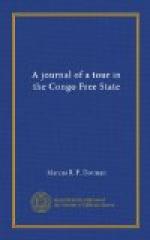As the Flandre moors we decide to go ashore hunting. Within a few yards of the bank is the lair of a hippopotamus and the spoor of elephants. It is however, very difficult walking, for patches of land are covered with long grass seven or eight feet high and the rest is bog. After struggling along for a few minutes, I hear a curious noise like a very asthmatic fog horn not above five yards away. Nothing is however, visible, for the grass forms a complete cover. Again the grunt with a suspicious after-sniff and at the same moment Chikaia, who is carrying my gun snaps his fingers—the usual sign to indicate game—and beckons me to follow. I endeavour to do so, and at once sink in the bog up to the knees, but fortunately keep my rifle dry. By clutching the grass, I get out and we follow the spoor of the hippo as rapidly as possible. This is very clearly marked, for the grass has been recently thrust aside and there are great holes in the soft mud over a foot wide and deep, made by the great feet of the beast. These holes were in pairs lying close together, showing that the hippo was galloping as he passed and unfortunately they led straight to the river.
Next day we leave the Pool and enter a part of the river called the Channel. Here there are no islands and both banks are visible all the time, the width not being more than a mile in some places. A low range of hills covered with acacias or coarse grass, exists on each side. As usual, we stop at a Wood Post to take fuel on board. This is cut in logs three or four feet long and stacked in heaps about the same in width and height. Sticks are placed in the ground connected by lines at the required height and the logs are laid in rows until the space is filled. The result is a cubic yard of wood known in the Congo as a bras, but the bras differs in size and price considerably, in some cases the cost being 5 mitakos and in others double that amount. A native can easily collect a bras of wood in the forest and carry it to the bank in a day and in some of the Wood Posts fifty or sixty natives are employed. Even then however, the demand for wood by the big steamers is sometimes greater than the supply.
At 6 p.m. every day the steamer stops for the night and makes fast to a tree on the bank. All the native passengers at once go ashore, light fires and arrange their beds for the night. They sleep on mats or with the whole body, and head also, wrapped up closely in rugs. Either their feet or heads are always within a few inches of the fire and their bodies radiate out like the spokes of a wheel. Until 9.30 p.m., however, when all lights on the steamer must be put out, a ceaseless chatter proceeds with an occasional angry discussion as the natives take their meal of kwanga, fish, and any odd piece of meat they can procure. It is a somewhat weird sight, the black forms showing dimly in the ruddy light of the fires under the trees. The bell on the steamer




